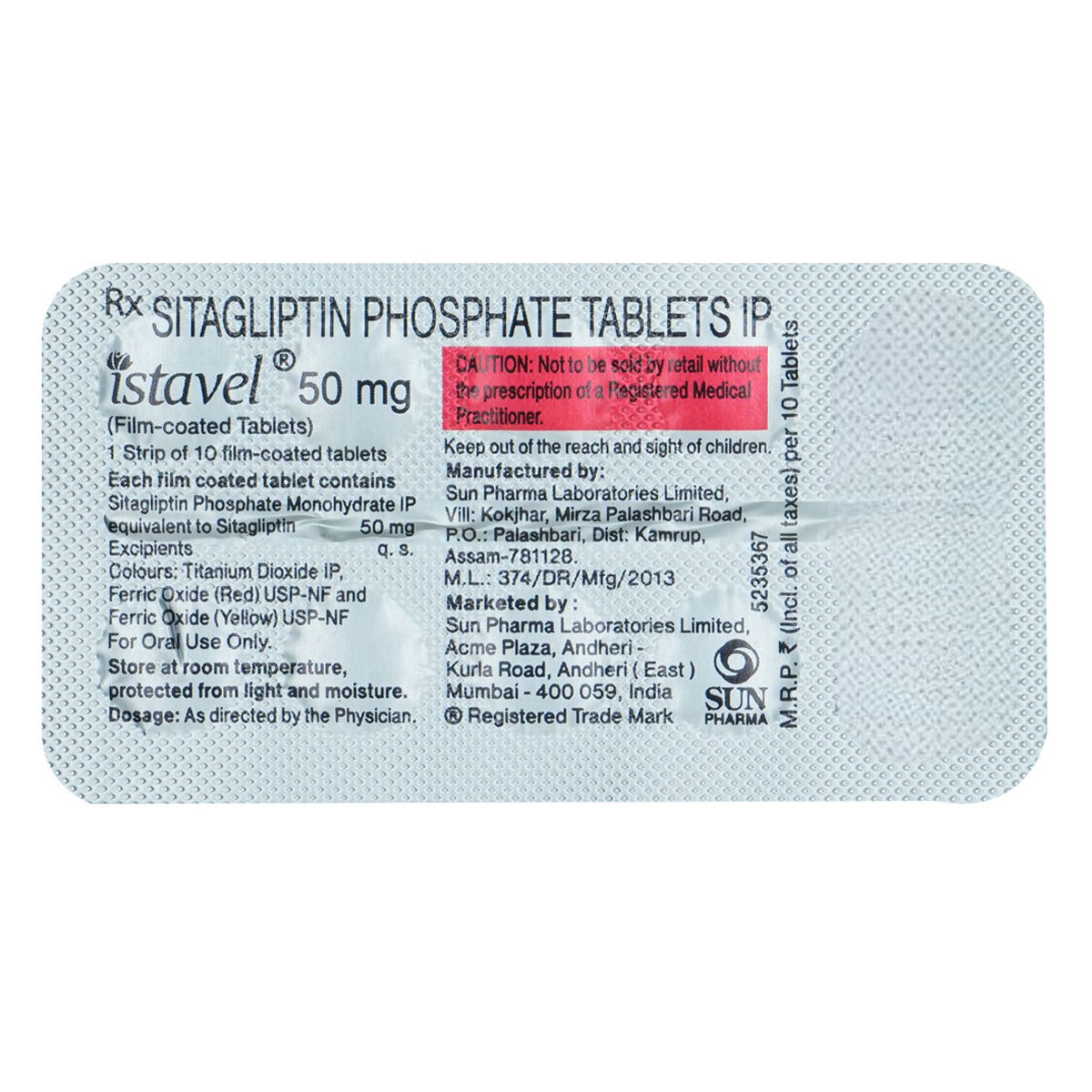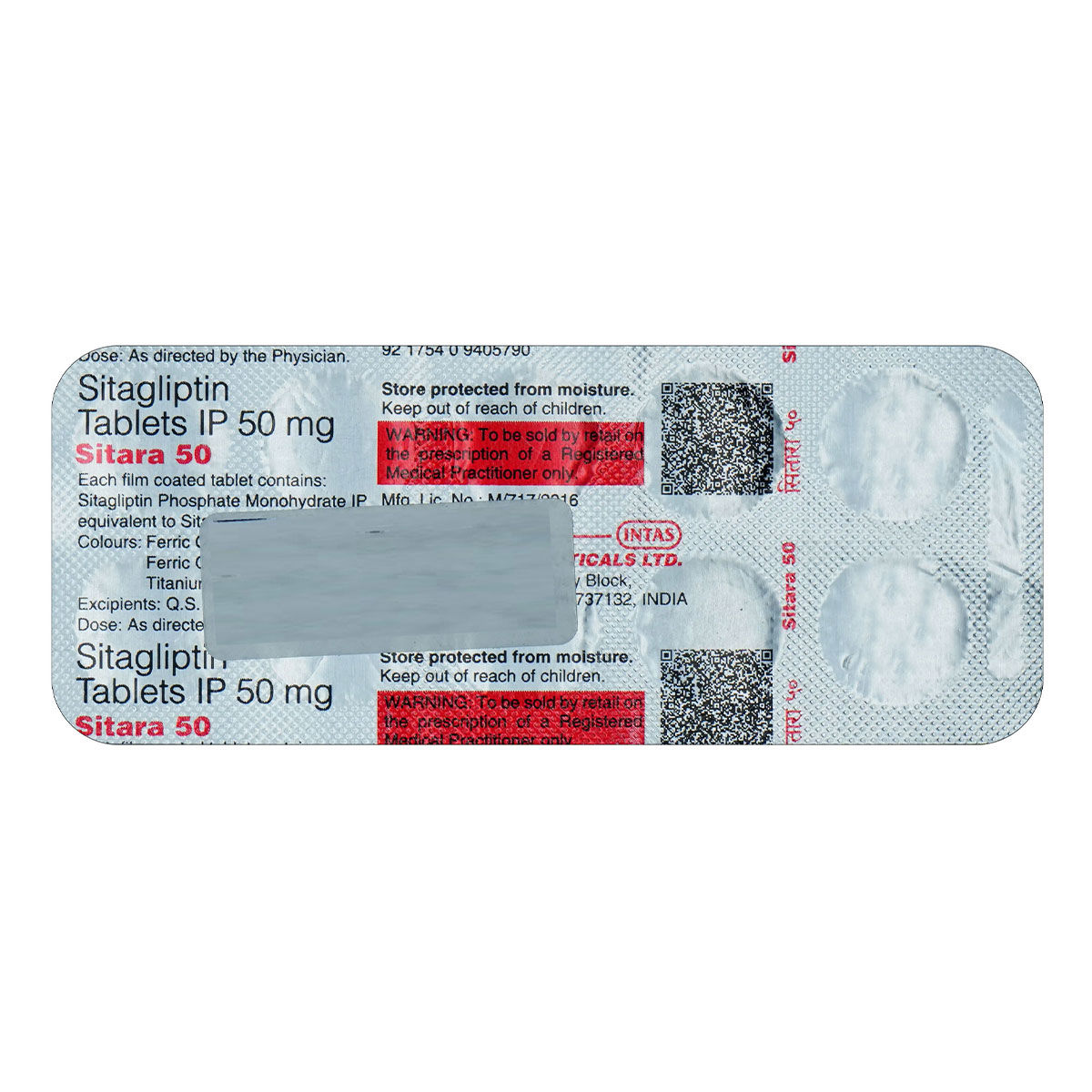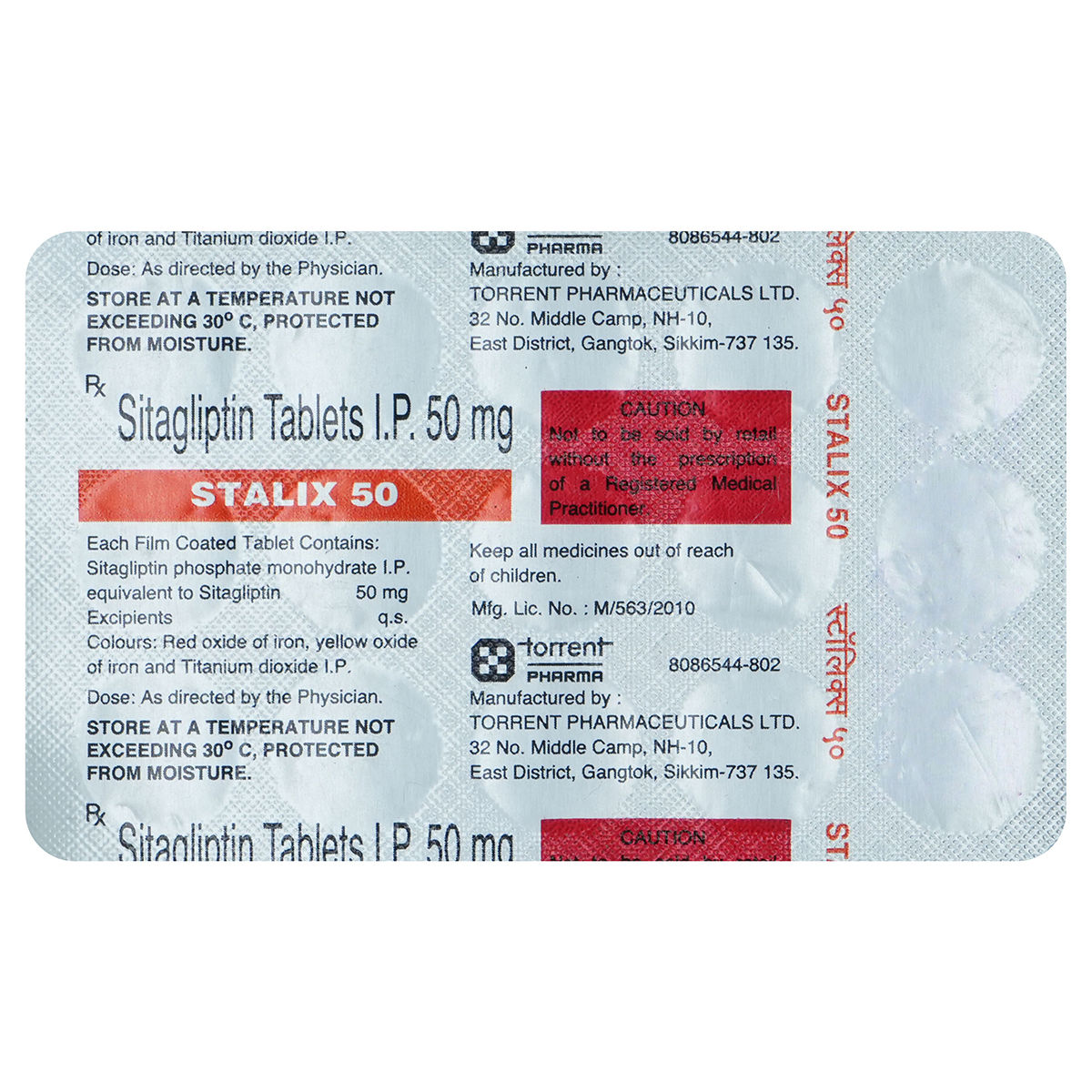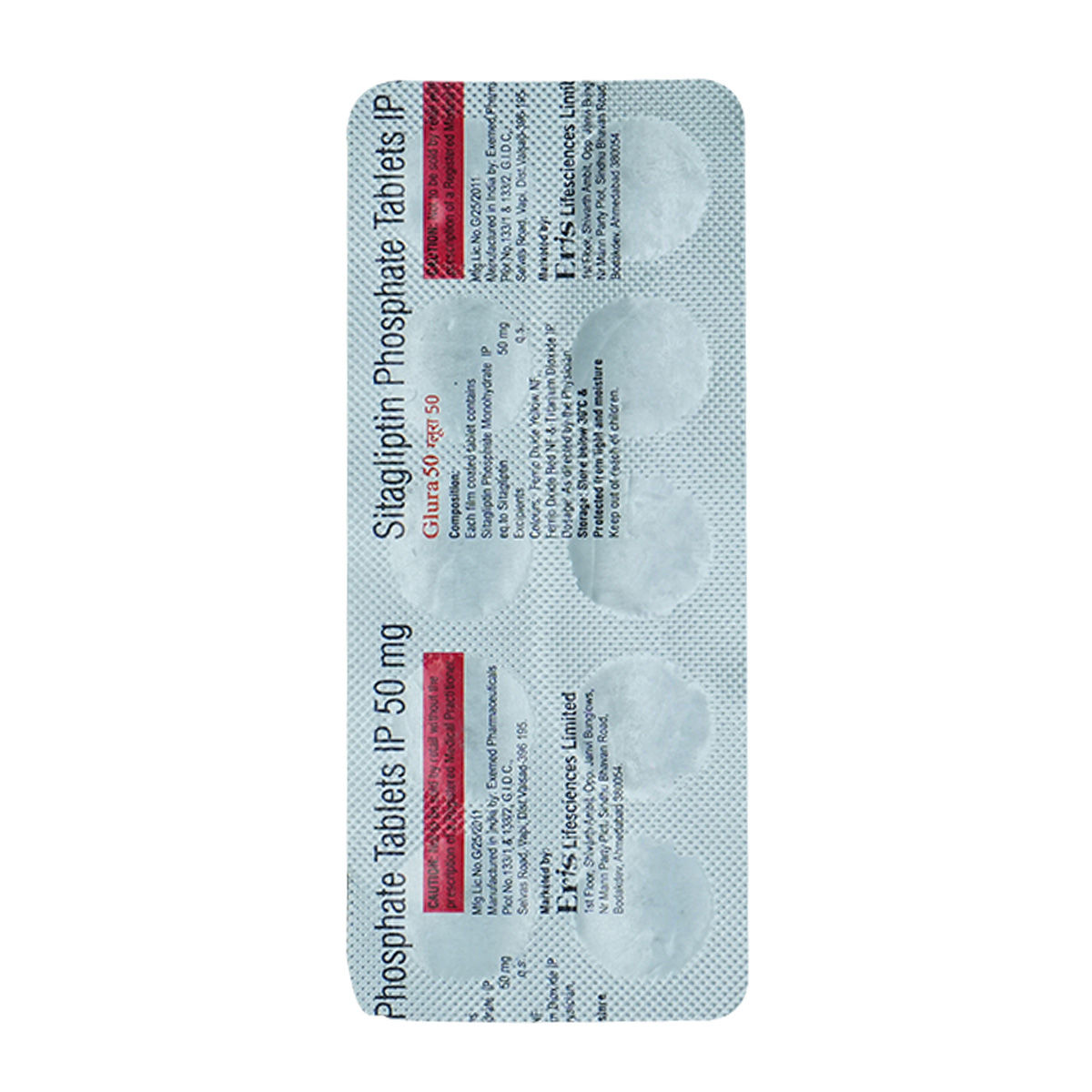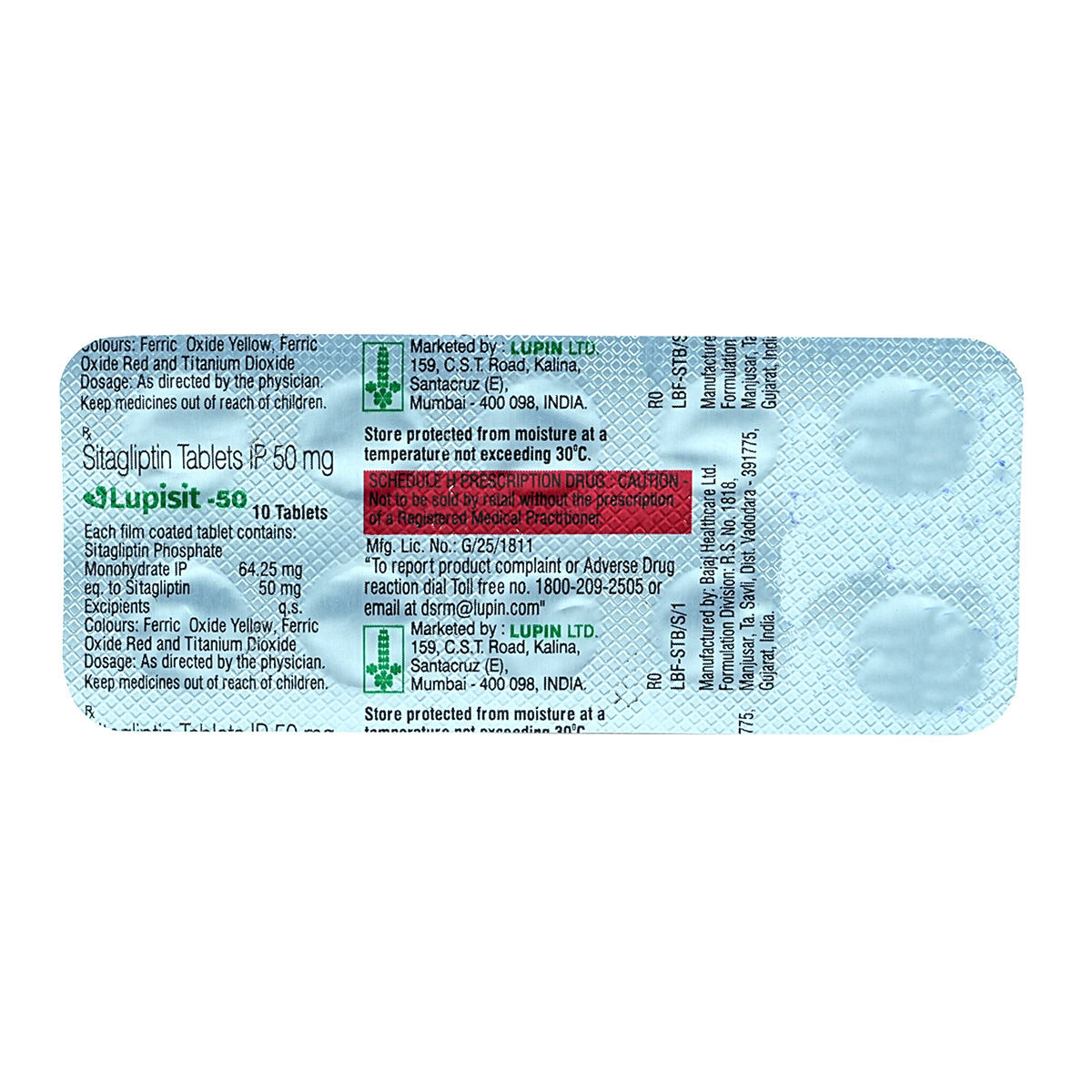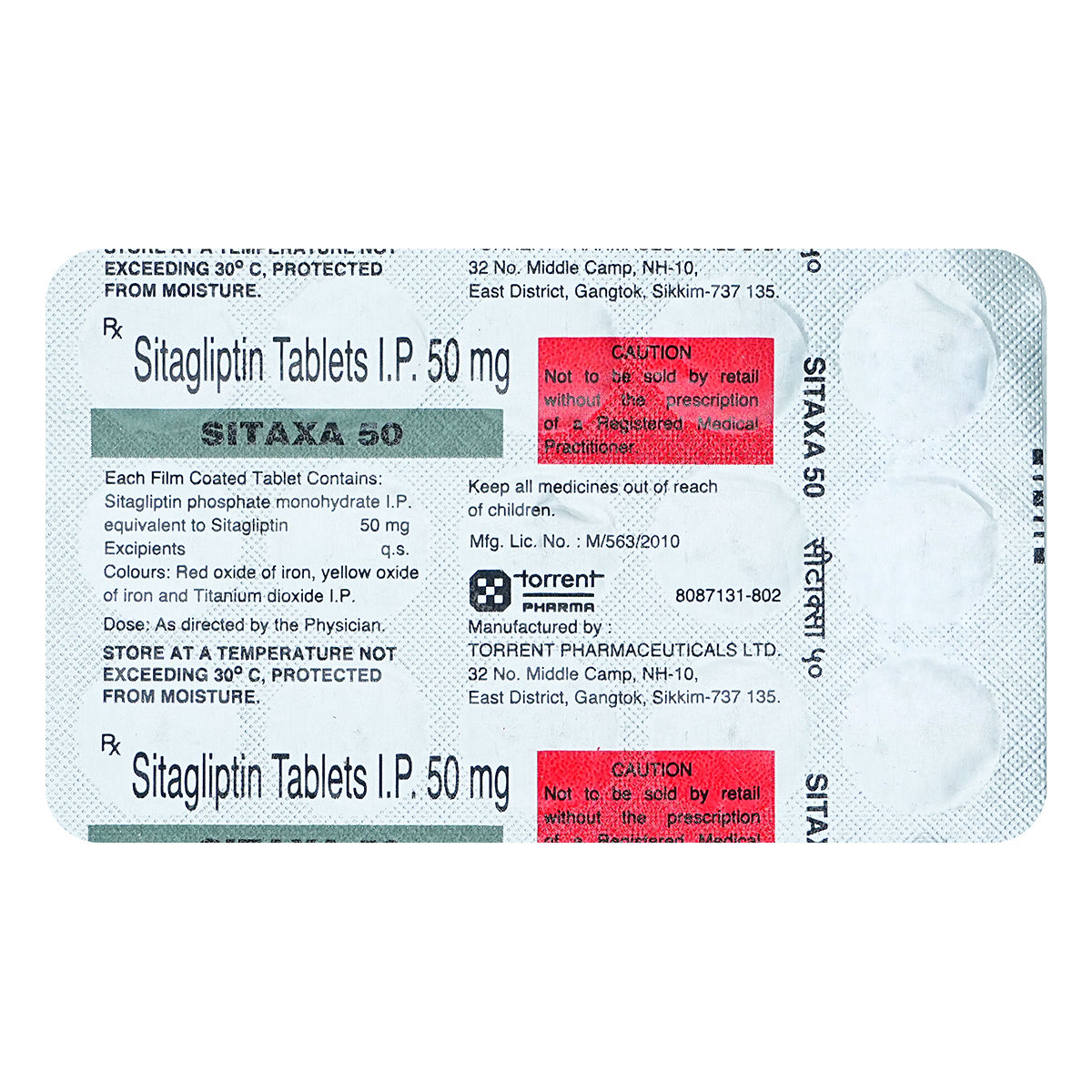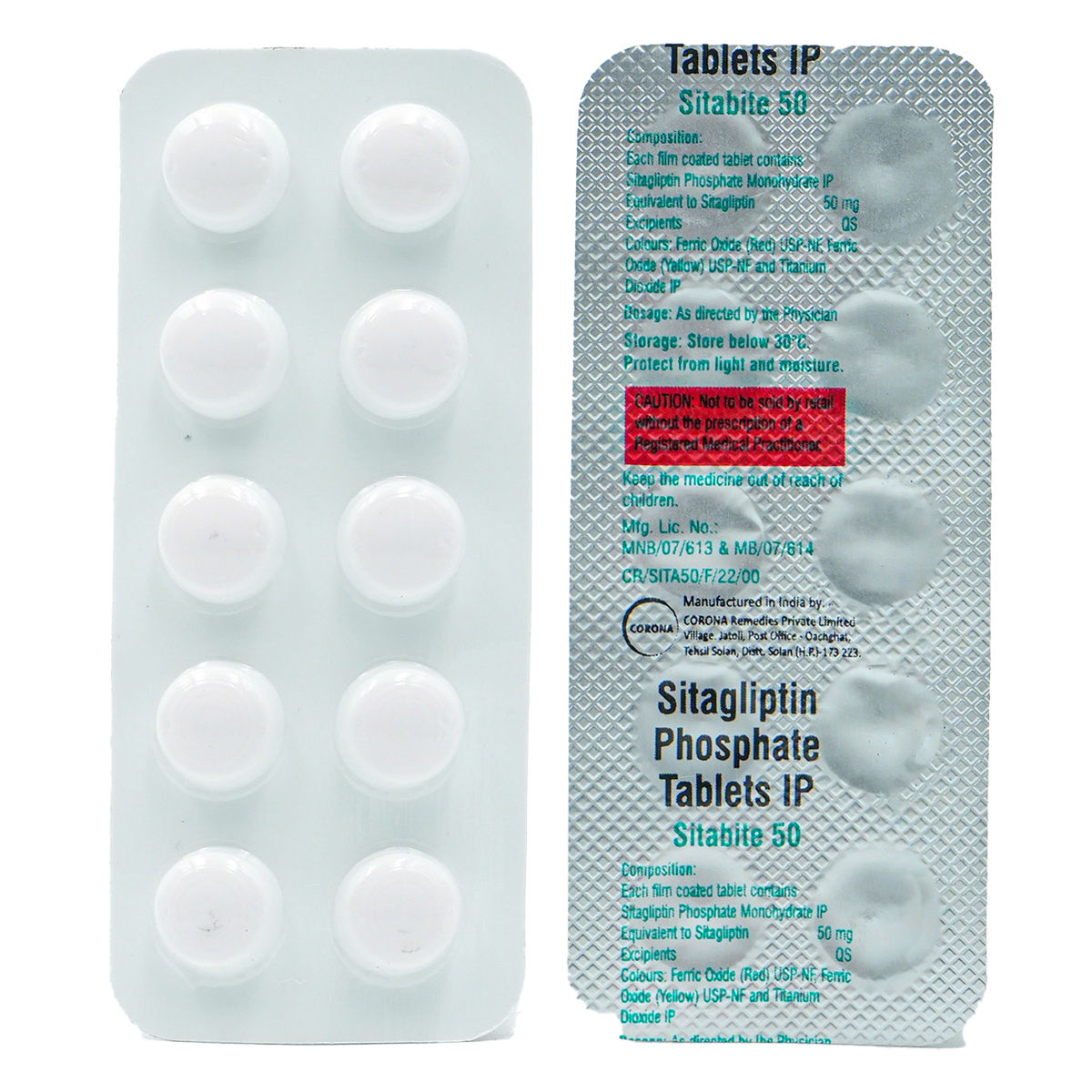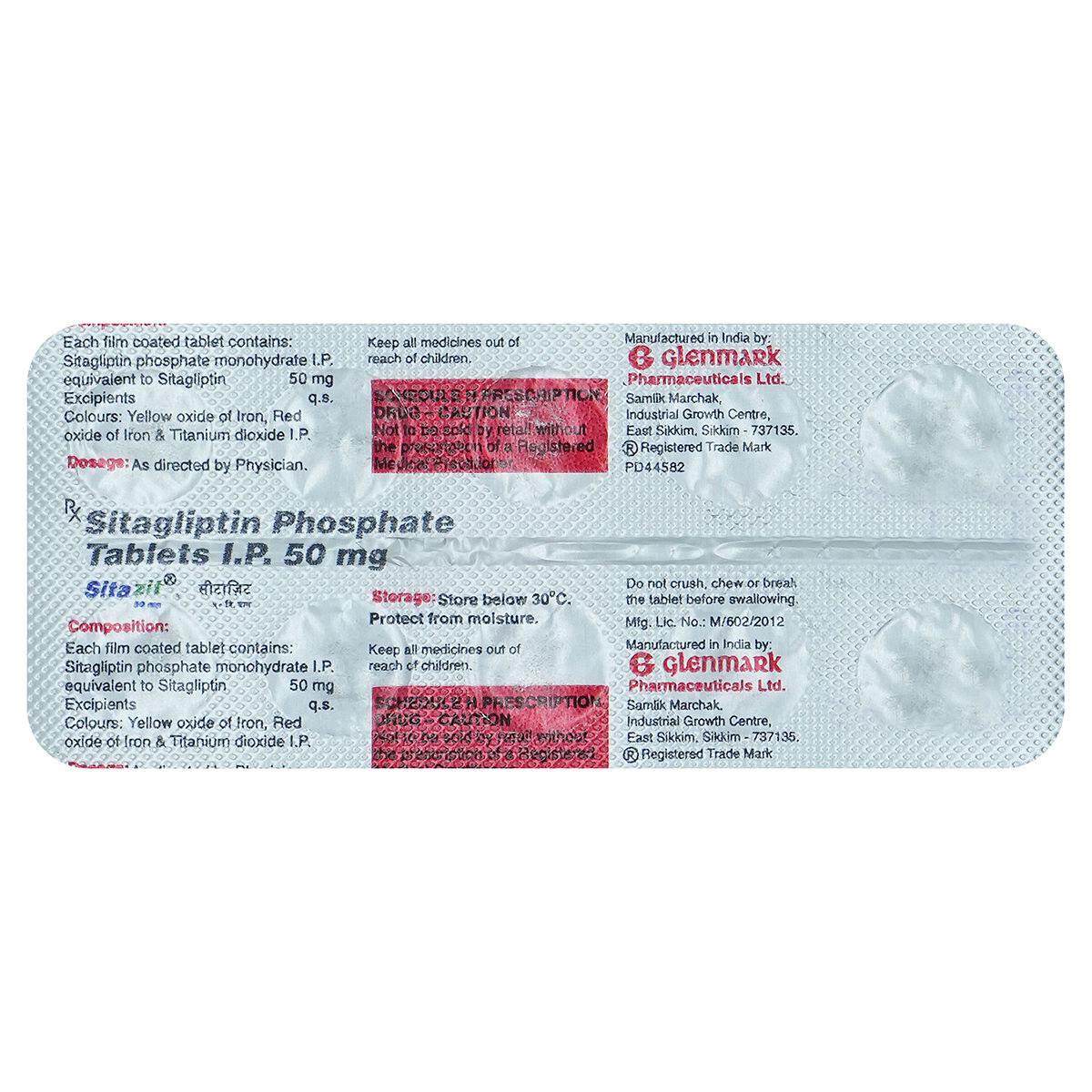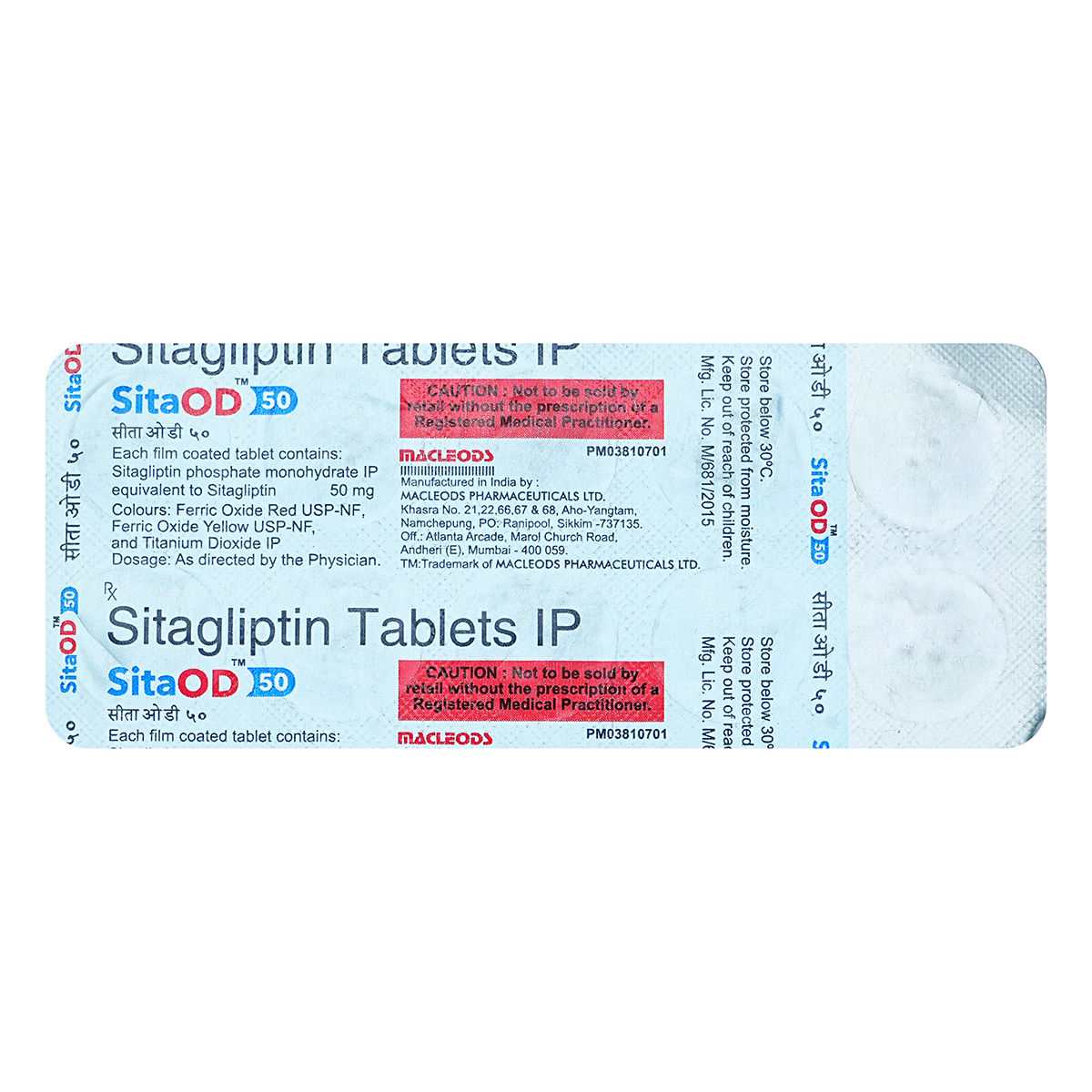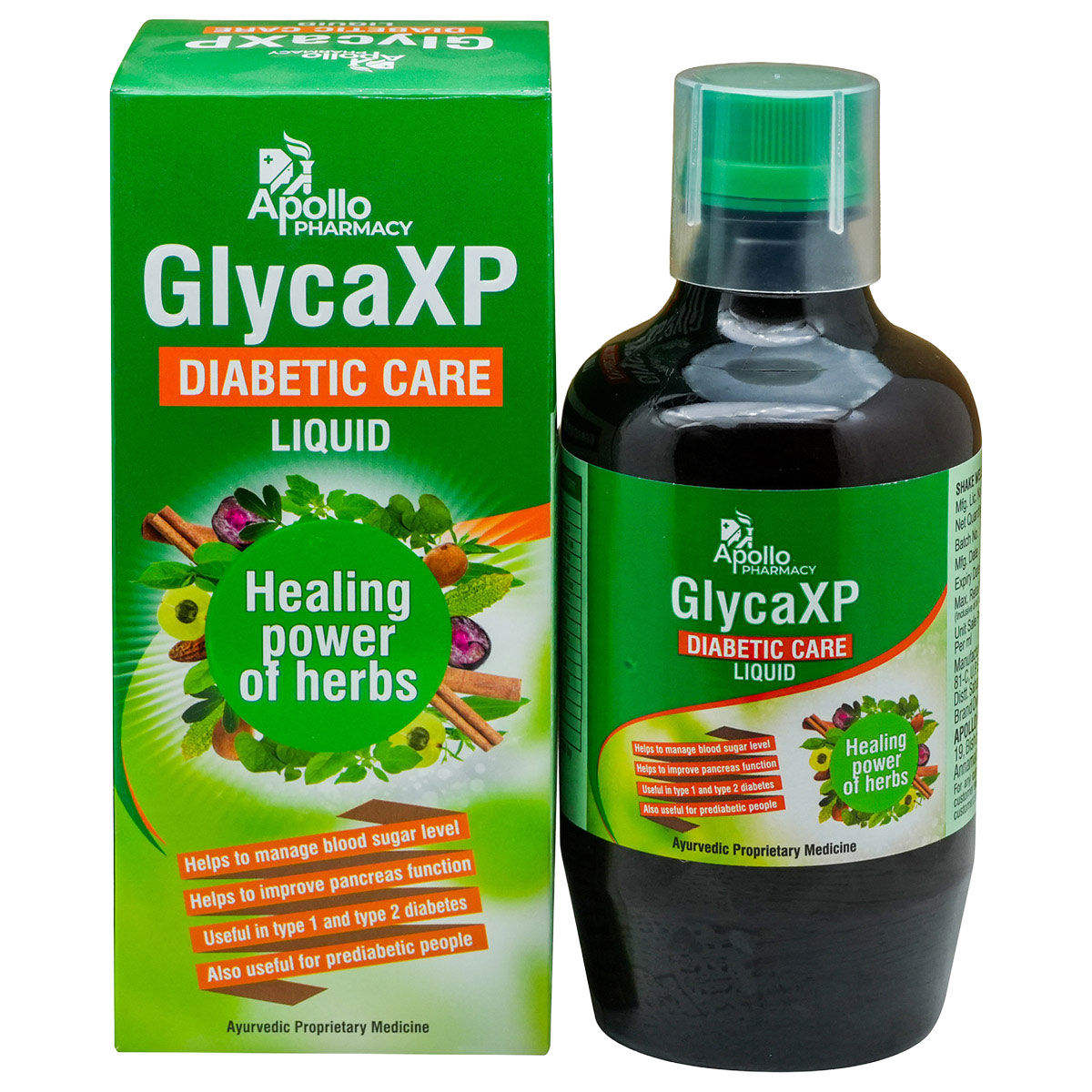Januvia 50 mg Tablet 7's
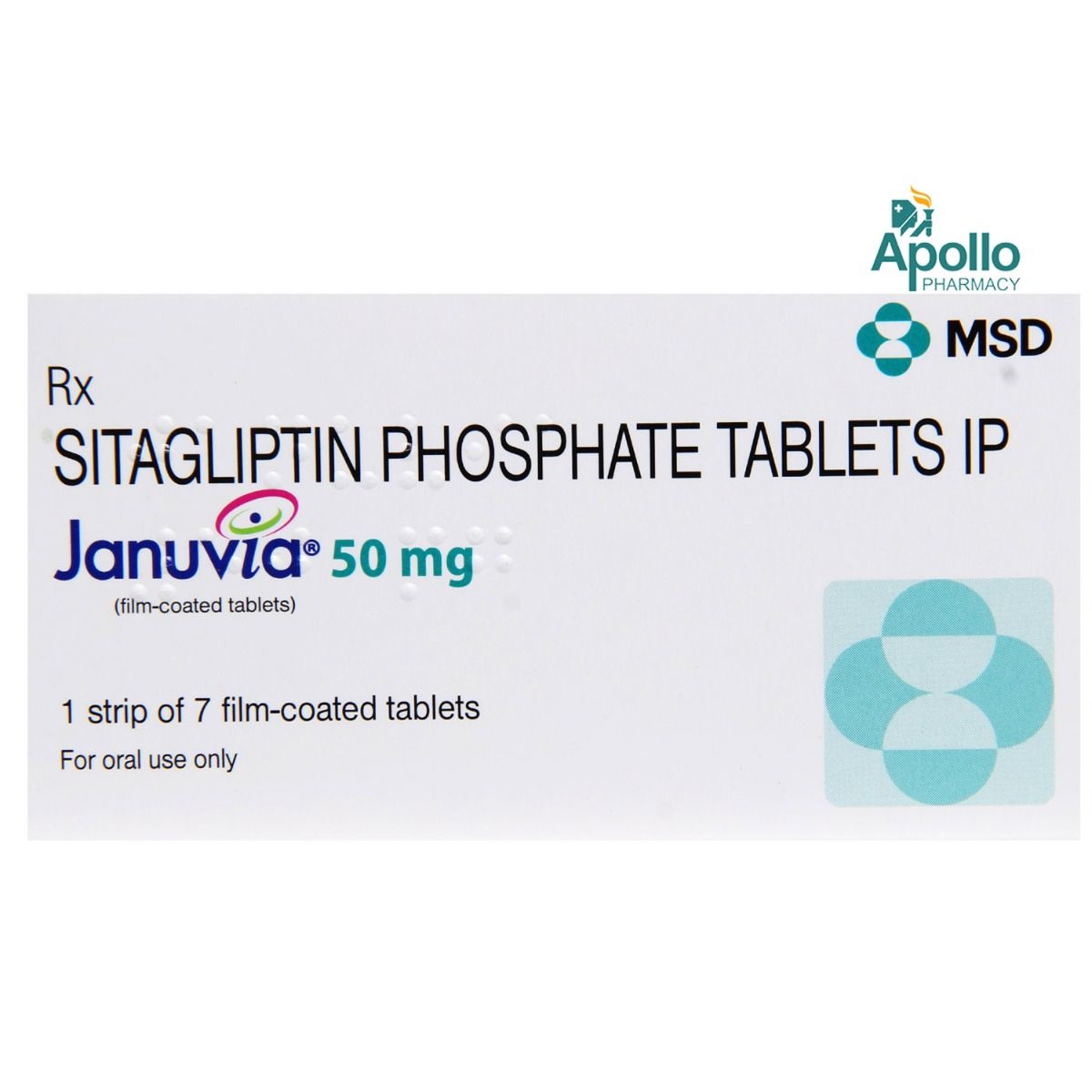




₹260.6*
MRP ₹289.5
10% off
₹246.07*
MRP ₹289.5
15% CB
₹43.43 cashback(15%)
Free Delivery
With Circle membership
(Inclusive of all Taxes)
This offer price is valid on orders above ₹800. Apply coupon PHARMA10/PHARMA18 (excluding restricted items)
Januvia 50 mg Tablet is used to reduce high blood sugar levels in patients who consistently follow a balanced diet and exercise. It works by increasing the amount of insulin in the body. It may cause side effects such as upper respiratory tract infections, headaches, and nasopharyngitis (inflammation of nasal passages). Take it as prescribed by your doctor.
Know Your Delivery Time
Provide Delivery Location
Available Offers
 Prescription drug
Prescription drugWhats That
 232 people bought
232 people bought 
Secure Payment

India's Most Trusted Pharmacy

Genuine Products
Composition :
Manufacturer/Marketer :
Consume Type :
Return Policy :
Expires on or after :
About Januvia 50 mg Tablet
Januvia 50 mg Tablet belongs to the group of anti-diabetic medicines called DPP-4 inhibitors (dipeptidyl peptidase-4 inhibitors) used to treat type-2 diabetes mellitus. Type-2 diabetes mellitus is a condition in which blood sugar is too high because the body does not produce or use insulin normally.
Januvia 50 mg Tablet contains Sitagliptin, which works by blocking the action of DPP-4 (dipeptidyl peptidase-4) and increases the amount of insulin made by the body. Thus, it helps lower blood glucose levels.
In some cases, Januvia 50 mg Tablet may cause side effects such as upper respiratory tract infections, headache, and nasopharyngitis (inflammation of nasal passages). Most of these side effects may not require medical attention and resolve gradually over time. However, you are advised to consult the doctor if any side effects persist or worsen.
Do not take Januvia 50 mg Tablet if you are allergic to any of its components. Consult the doctor if you are pregnant or breastfeeding. Januvia 50 mg Tablet is not recommended in children below 18 years. Keep the doctor informed about your health condition and medications to rule out any unpleasant side effects/interactions.
Uses of Januvia 50 mg Tablet
Directions for Use
Medicinal Benefits
Januvia 50 mg Tablet contains Sitagliptin, which belongs to the group of anti-diabetic medicines called DPP-4 inhibitors (dipeptidyl peptidase-4 inhibitors). It is indicated as an adjunct to diet and exercise to improve glycemic control in adults with type 2 diabetes mellitus. Januvia 50 mg Tablet works by blocking the action of DPP-4 (dipeptidyl peptidase-4) and increasing the amount of insulin made by the body. Thus, it helps lower blood glucose levels.
How Januvia 50 mg Tablet Works
Storage
- If you experience low blood sugar levels, inform your doctor. They will assess the severity and make recommendations for the next actions.
- Your doctor will assess your symptoms, blood sugar levels, and overall health before recommending the best course of action, which may include treatment, lifestyle modifications, or prescription adjustments.
- Follow your doctor's instructions carefully to manage the episode and adjust your treatment plan.
- Make medication adjustments as recommended by your doctor to prevent future episodes.
- Implement diet and lifestyle modifications as your doctor advises to manage low blood sugar levels.
- Monitor your blood sugar levels closely for patterns and changes.
- Track your progress by recording your blood sugar levels, food intake, and physical activity.
- Seek further guidance from your doctor if symptoms persist or worsen so that your treatment plan can be revised.
- Drink water or other clear fluids.
- To prevent worsening of pain, limit intake of tea, coffee, or alcohol.
- Include bland foods like rice, toast, crackers, and rice in your diet.
- Avoid lying down immediately after eating as it may cause indigestion or heartburn.
- Avoid acidic and spicy food as it may cause indigestion.
- Drink warm fluids such as warm water with honey, broth, soup or herbal tea to soothe sore throat.
- Gargle with warm salt water.
- Suck on lozenges to increase the production of saliva and soothe your throat.
- Use a humidifier to soothe sore throat as it adds moisture to the air and makes breathing easier.
- Hydrate your body: Drink enough water to prevent dehydration and headaches.
- Calm Your Mind: Deep breathing and meditation can help you relax and relieve stress.
- Rest and Recharge: Sleep for 7-8 hours to reduce headache triggers.
- Take rest: lie down in a quiet, dark environment.
- Cold or warm compresses can help reduce tension.
- Stay Upright: Maintain good posture to keep symptoms from getting worse.
- To treat headaches naturally, try acupuncture or massage therapy.
- Over-the-counter pain relievers include acetaminophen and ibuprofen.
- Prescription Assistance: Speak with your doctor about more substantial drug alternatives.
- Severe Headaches: Seek emergency medical assistance for sudden, severe headaches.
- Frequent Headaches: If you get reoccurring headaches, consult your doctor.
- Headaches with Symptoms: Seek medical attention if your headaches include fever, disorientation, or weakness.
- Inform your doctor about the nausea and discuss possible alternatives to the medication or adjustments to the dosage.
- Divide your daily food intake into smaller, more frequent meals to reduce nausea.
- Opt for bland, easily digestible foods like crackers, toast, plain rice, bananas, and applesauce.
- Avoid certain foods that can trigger nausea, such as fatty, greasy, spicy, and smelly foods.
- Drink plenty of fluids, such as water, clear broth, or electrolyte-rich beverages like coconut water or sports drinks.
- Use ginger (tea, ale, or candies) to help relieve nausea.
- Get adequate rest and also avoid strenuous activities that can worsen nausea.
- Talk to your doctor about taking anti-nausea medication if your nausea is severe.
- Record when your nausea occurs, what triggers it, and what provides relief to help you identify patterns and manage your symptoms more effectively.
- Inform Your Doctor: Notify your doctor immediately about your diarrhoea symptoms. This allows them to adjust your medication or provide guidance on managing side effects.
- Stay Hydrated: Drink plenty of fluids to replace lost water and electrolytes. Choose water, clear broth, and electrolyte-rich drinks. Avoid carbonated or caffeinated beverages to effectively rehydrate your body.
- Follow a Bland Diet: Eat easy-to-digest foods to help firm up your stool and settle your stomach. Try incorporating bananas, rice, applesauce, toast, plain crackers, and boiled vegetables into your diet.
- Avoid Trigger Foods: Steer clear of foods that can worsen diarrhoea, such as spicy, fatty, or greasy foods, high-fibre foods, and dairy products (especially if you're lactose intolerant).
- Practice Good Hygiene: Maintain good hygiene to prevent the spread of infection. To stay healthy, wash your hands frequently, clean and disinfect surfaces regularly, and avoid exchanging personal belongings with others.
- Take Anti-Diarrheal Medications: If your doctor advises, anti-diarrheal medications such as loperamide might help manage diarrhoea symptoms. Always follow your doctor's directions.
- Keep track of your diarrhoea symptoms. If they don't get better or worse or are accompanied by severe stomach pain, blood, or dehydration signs (like extreme thirst or dark urine), seek medical help.
- Inform your doctor about the common cold symptoms you're experiencing due to medication.
- Your doctor may adjust your treatment plan, which could include changing your medication, adding new medications, or offering advice on managing your symptoms.
- Practice good hygiene, including frequent handwashing, avoiding close contact with others, and avoiding sharing utensils or personal items.
- Drink plenty of fluids, such as warm water or soup, to help thin out mucus.
- Get plenty of rest and engage in stress-reducing activities to help your body recover. If your symptoms don't subside or worsen, consult your doctor for further guidance.
What if I have taken an overdose of Januvia 50 mg Tablet
Drug Warnings
Do not take Januvia 50 mg Tablet if you are allergic to any of its components. Inform the doctor if you have kidney or liver problems, pancreatitis (inflammation of the pancreas), gallstones, type 1 diabetes, diabetic ketoacidosis (a complication of diabetes with high blood sugar, rapid weight loss, nausea or vomiting), a history of alcoholism, heart problems/heart failure, or high blood triglyceride levels. Consult the doctor if you are pregnant or breast-feeding. Seek medical attention if you experience symptoms of pancreatitis (severe abdominal pain) or heart failure (shortness of breath, swelling in the legs, unusual tiredness). Let the doctor know if you are taking any other medicines, including supplements and herbal products.
Drug-Drug Interactions
Drug-Drug Interactions
Login/Sign Up
Co-administration of Januvia 50 mg Tablet with Gatifloxacin may sometimes affect blood glucose levels. Both high blood glucose and, less frequently, low blood glucose have been reported.
How to manage the interaction:
Taking Januvia 50 mg Tablet with Gatifloxacin is not recommended as it can lead to a possible interaction, However, it can be taken if advised by the doctor. Consult the prescriber if you experience symptoms such as nervousness, confusion, headache, dizziness, drowsiness, tremors, nausea, hunger, weakness, perspiration, palpitation, rapid heartbeat, increased urination, increased thirst, and increased hunger. Maintaining blood glucose levels is advised. Do not stop using any medications without a doctor's advice.
When Januvia 50 mg Tablet is taken with Ivacaftor, the amount of Januvia 50 mg Tablet in the blood can go up.
How to manage the interaction:
Taking Januvia 50 mg Tablet with Ivacaftor together can possibly result in an interaction, but it can be taken if a doctor has advised it. Do not discontinue any medications without consulting a doctor.
Drug-Food Interactions
Drug-Food Interactions
Login/Sign Up
Diet & Lifestyle Advise
- Include fruits, vegetables, whole grains, and beans in your diet.
- Try eating food at regular intervals. Do not skip meals. Also, try not to overeat.
- Maintain a healthy weight by exercising regularly.
- Rest properly.
- Avoid stress by doing meditation or yoga.
- Limit saturated and processed food.
- Stay physically active as it helps manage blood glucose levels.
- Avoid/limit the consumption of alcohol as it may affect blood sugar levels.
Habit Forming
Therapeutic Class
Januvia 50 mg Tablet Substitute

Istavel 50 mg Tablet 10's
by Others
₹9.18per tabletSitara 50 mg Tablet 10's
by Others
₹9.77per tabletSitaday 50 Tablet 15's
by Others
₹9.18per tabletStalix 50 mg Tablet 15's
by Others
₹11.22per tabletGlura 50 Tablet 10's
by Others
₹10.85per tablet
Product Substitutes
Alcohol
Caution
It is not known if alcohol interacts with Januvia 50 mg Tablet. However, avoid/limit alcohol consumption as it might affect blood sugar levels.
Pregnancy
Caution
Sitagliptin belongs to pregnancy category B. There are no adequate and well-controlled studies in pregnant women. Please consult the doctor if you are pregnant or planning for pregnancy.
Breast Feeding
Caution
Januvia 50 mg Tablet should be taken with caution if you are breastfeeding. Please consult your doctor for more information about using Januvia 50 mg Tablet during lactation.
Driving
Caution
This medicine may cause dizziness and drowsiness. Drive or operate machinery only if you are alert.
Liver
Consult your doctor
If you have liver disease, inform your doctor before taking Januvia 50 mg Tablet.
Kidney
Caution
Dose adjustment may be needed in patients with moderate or severe renal insufficiency. Please consult the doctor if you have kidney problems.
Children
Unsafe
Januvia 50 mg Tablet is not recommended for children below 18 years as the safety and effectiveness have not been established.
FAQs
Januvia 50 mg Tablet is used to treat type 2 diabetes mellitus. It helps manage blood sugar levels.
Januvia 50 mg Tablet works by increasing the amount of insulin made by the body. Thus, it helps lower blood glucose levels.
Do not stop taking Januvia 50 mg Tablet without consulting your doctor, as it may cause an increase in blood glucose levels. Continue taking Januvia 50 mg Tablet for as long as your doctor has prescribed it to you. Speak with your doctor if you experience any difficulty while taking Januvia 50 mg Tablet.
Some people taking Januvia 50 mg Tablet may develop joint pain that could be severe. Consult the doctor if you have severe joint pain.
Januvia 50 mg Tablet may cause hypoglycaemia (low blood sugar) when taken in combination with other anti-diabetic medications. Talk to the doctor if you experience symptoms of low blood sugar, such as headache, dizziness, sweating, hunger, irritability, confusion, and fast heartbeat.
Eat healthy by including fruits, vegetables and whole grains in your diet. Maintain an active lifestyle by exercising regularly. Manage stress by doing deep breathing or yoga. Avoid smoking and alcohol consumption.
Januvia 50 mg Tablet should be swallowed as a whole with water; do not crush or chew it.
Januvia 50 mg Tablet can be taken during pregnancy only if prescribed by the doctor.
Januvia 50 mg Tablet may not cause weight gain. Maintain proper weight by eating healthy food and exercising regularly.
Januvia 50 mg Tablet may cause kidney problems, sometimes requiring dialysis. The doctor will monitor kidney function before and during treatment with Januvia 50 mg Tablet.
Januvia 50 mg Tablet is indicated as an adjunct to diet and exercise to improve glycemic control in adults with type 2 diabetes mellitus. Therefore, it is important to stay on the diet and exercise recommended by your doctor while taking Januvia 50 mg Tablet.
You may experience hypoglycaemia (low blood sugar) if you take more than the prescribed dose of Januvia 50 mg Tablet. Monitor your blood sugar levels regularly and consult the doctor if you have overdosed.
If you miss a dose of Januvia 50 mg Tablet take it as soon as you remember, However, if it is almost time for the scheduled dose, skip the missed dose and take the next dose at the scheduled time.
Yes, it is safe to take Januvia 50 mg Tablet for the long term if prescribed by the doctor.
You are advised to take Januvia 50 mg Tablet for the duration prescribed by the doctor. As type 2 diabetes is a lifelong condition, Januvia 50 mg Tablet may be prescribed for a longer duration.
Januvia 50 mg Tablet may cause serious side effects like pancreatitis (inflammation of the pancreas), and heart failure. Consult the doctor if you experience severe and persistent pain in the abdomen as it could be a sign of an inflamed pancreas. Seek immediate medical attention if you have signs of heart failure like shortness of breath or trouble breathing, fluid retention, unusually fast increase in weight, and unusual tiredness.
Januvia 50 mg Tablet may cause side effects such as upper respiratory tract infections, headache, and nasopharyngitis (inflammation of nasal passages). Consult the doctor if any side effects persist or worsen.
Avoid using Januvia 50 mg Tablet if you are allergic to any of its components. It should not be used in patients with type 1 diabetes, or pancreatitis.
Januvia 50 mg Tablet may interact with some medicines, hence, let the doctor know if you are taking any other medicines during treatment with Januvia 50 mg Tablet. Particularly, inform the doctor if you are using insulin, digoxin, furosemide or levothyroxine.
Regular monitoring of blood sugar levels is advised. It is recommended to stay on your prescribed diet and exercise program while taking Januvia 50 mg Tablet. Consult the doctor if you have stress, fever, trauma, infection or surgery; the doctor may adjust the dose in such cases.
On prolonged use, Januvia 50 mg Tablet may increase the risk of pancreatitis and kidney problems.
Country of origin
Manufacturer/Marketer address
Customers Also Bought
Disclaimer
Author Details
We provide you with authentic, trustworthy and relevant information
Reference
Recommended for a 30-day course: 5 Strips






